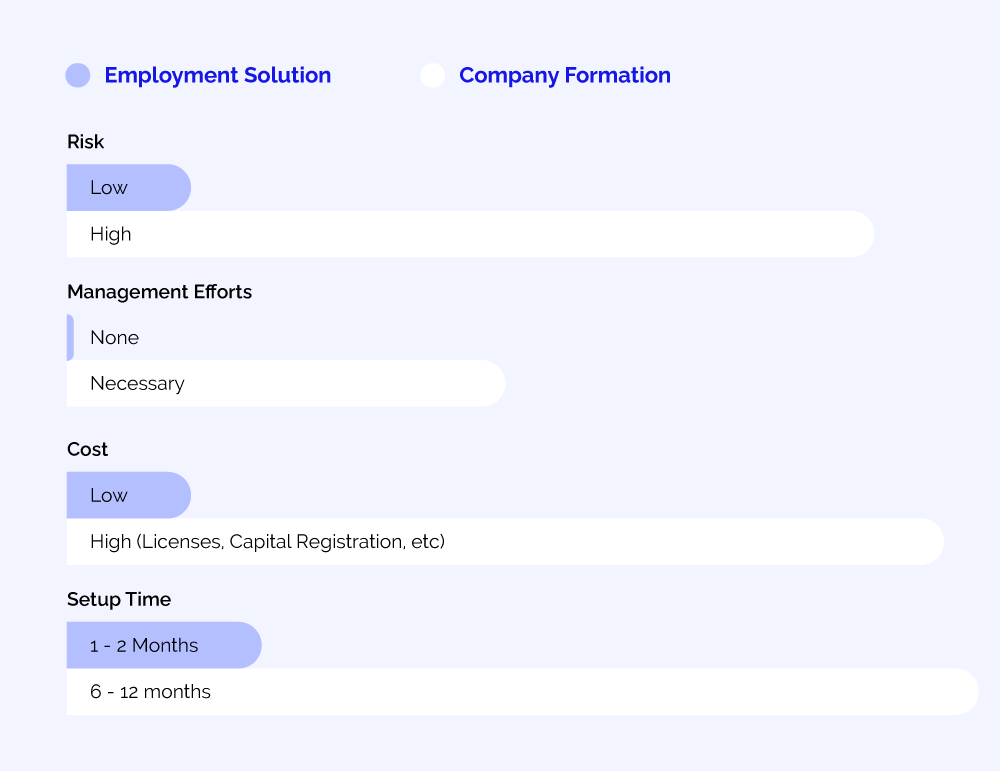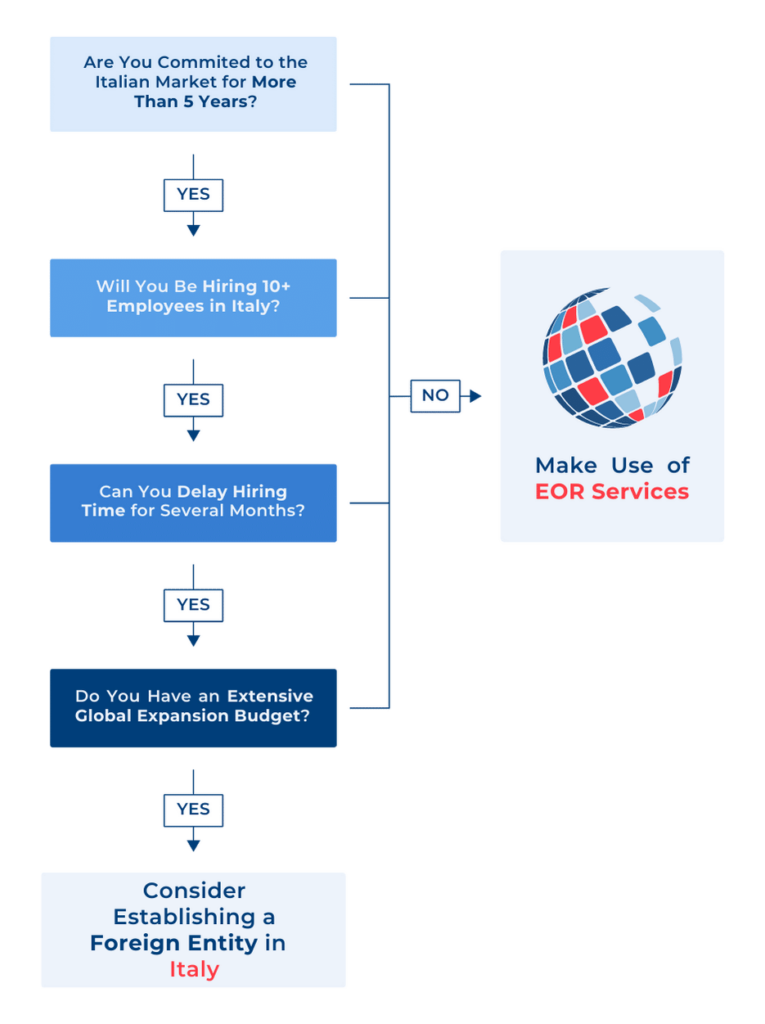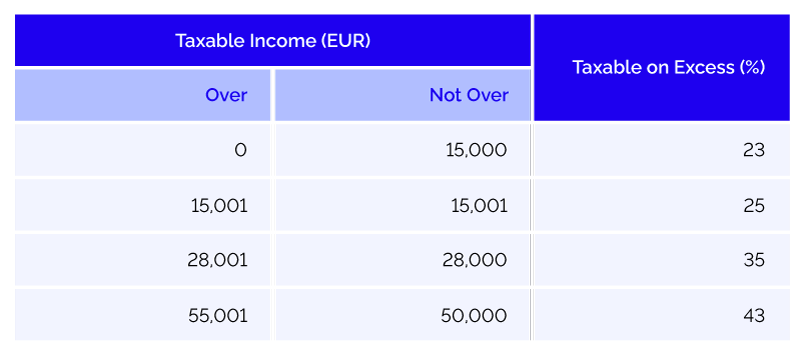PEO가 현지 법률의 모든 잠재적 문제에 대해 규정 준수를 보장하기 위해 현지의 행정 및 법적 절차에 대한 지식을 활용할 수 있습니다.
인사 관리와 관련된 단순한 문제들이 신규 시장에 진입하는 많은 기업들이 높은 수수료와 벌금을 부과받을수도 있습니다. PEO는 현지 전문가의 지도를 통해 이러한 실수를 방지할 수 있도록 기업에게 지침을 제공합니다.
PEO는 이탈리아에서 급여 대행, 채용 및 계약자 관리 서비스를 제공함으로써, 귀사의 직원들이 성장에 집중하는 동안 새로운 시장 진입에 필요한 인사 프로세스를 처리합니다.
이탈리아에서의 회사 설립 시간: 4-12개월
이탈리아에서 PEO 관계를 설정하는 데 걸리는 시간: 5일
*예상값
PEO는 모든 HR 서비스의 핵심 측면을 커버하며 이 정보를 하나의 연락처 지점으로 통합하여 방해되는 데이터나 커뮤니케이션 중첩의 양을 제한합니다.
회사 설립에 비해 PEO의 경쟁 우위
PEO:


INS Global의 컨설턴트는 다음과 같은 간단한 단계로 이탈리아 PEO 계약을 시작할 수 있습니다:
이탈리아 시장으로 진출하고 EOR/PEO 계약을 시작하기로 결정하면, 이 두 가지 솔루션의 차이점을 이해하여 전문적인 필요사항에 더 잘 맞는 선택을 해야 합니다.
PEO는 다른 회사의 직원들에게 HR 서비스를 제공하는 회사입니다.
INS Global는 귀사의 필요에 따라 PEO 및 EOR 서비스를 이태리에서 제공할 수 있습니다. 이 글을 읽거나 전문가 팀에 문의하여 PEO와 EOR에 대해 더 자세히 알아보고 귀사에 가장 적합한 솔루션을 결정하세요.
유럽 연합 지침 제 533/91호에 따라 이탈리아에서 시행되는 대로, 계약의 주요 조건에 대한 정보는 서면으로 작성되어 근로자가 고용된 날로부터 30일 이내에 제공되어야 합니다.
이탈리아의 고용 계약은 일반적으로 무기한 기간을 갖습니다.
기본 근무 시간은 일주일에 최대 40시간을 초과해서는 안 됩니다. 이를 초과하는 시간은 연장 근무로 간주됩니다.
이에 덧붙여, 일반적으로 연장 근무 시간은 일주일에 최대 8시간을 초과해서는 안 됩니다. 그러나 이는 업종에 따라 달라질 수 있는 단체 협약에 따라 달라질 수 있습니다.
법적으로, 연장 근무는 기본 임금의 최소 110%로 지급되어야 합니다. 그러나 실제로는 연장 근무 시간에 대한 임금은 130% 이상으로 지급되는 것이 일반적입니다.
이탈리아의 근로자는 4주의 유급 연차 휴가를 받을 자격이 있습니다.
이탈리아에는 11개의 공휴일이 있습니다(이탈리아의 각 지역별로 추가적인 휴일이 하루씩 더 있습니다). 근로자는 공휴일 당 하루의 유급 휴가를 받아야 합니다.
이탈리아에서 근로자는 최대 180일의 병가를 받을 자격이 있으며, 고용주는 처음 3일간의 병가를 지불합니다. 그 이후로 근로자는 일반적으로 표준 급여의 50-66%에 해당하는 병가 수당을 받게 됩니다.
출산 전 8주, 출산 후 12주 동안 출산 휴가를 취할 수 있습니다. 이는 시회보험을 통해 80%의 기본 급여를 받습니다.
많은 산업 분야에서는 직원의 급여 20%를 보상하도록 공동 합의가 필요합니다.
이탈리아에서 유급 부모 휴가는 아이 출생 후 처음 5개월 동안 10일입니다. 이는 사회보장을 통해 지급됩니다.
이탈리아 세제제도는 매년 발표되는 연간 재정법에 따라 대부분 법령화됩니다. 이탈리아의 주요 세금 종류는 소득세(IRES), 부가가치세(VAT), 기업 이익에 대한 소득세(IRES), 지방세 등이 있습니다. 회사의 경우 법인세가 부과되며, 종업원의 소득에는 소득세와 국민 건강보험, 국민 연금 등의 각종 공제가 적용됩니다.
일반적으로:
이탈리아에서 세금은 직접세와 간접세 두 가지 유형으로 나뉩니다. 직접세는 법인 및 개인의 소득세에 부과됩니다. 기타 세금에는 물품, 서비스 및 수입에 대한 세금이 포함됩니다.
개인 소득세는 국가 수준에서 23~45% 사이로 부과됩니다.

이탈리아에서 소득세는 지역별로 1.23%에서 3.33% 사이의 세율로 과세됩니다.
이탈리아의 법인소득세의 기준세율은 IRES에서 24%, IRAP에서 3.9%입니다.
고용주는 직원의 급여 대략 40%를 연금 및 사회보장 기여금으로 지불해야 하며 (직원은 약 10%를 부담합니다).
일반적으로, 기존 PEO를 사용하여 해외 직원을 고용주로 삼는 경우 1개월 정도의 시간이 필요합니다. 새로운 자회사를 설립하여 고용주가 되는 경우, 4-12개월의 지연이 발생할 수 있습니다.
You may move individuals legally, securely, and effectively when working with an Italy EOR. You can also acquire new employees where you need them. This approach has made outsourcing acceptable for both short-term and long-term initiatives.
An employee who is co-employed by an EOR may have access to a variety of services, including improved employee benefits, comprehensive legal protection, in-depth familiarity with all employer requirements locally, timely and accurate payment, and more.
While having complete control over their work process, contractors who interact with clients through an EOR or Italian PEO are entitled to many of the same perks and protections as regular workers.
Yes, an EOR safeguards your rights wherever you are while taking into consideration any modifications to local or regional labor legislation.
With certain PEO businesses, there can be a minimum or maximum amount of employees you can hire. To employ and outsource the HR of as many individuals as your growth plans require, use INS Global’s expansion services.
In addition to salaries and any payments made to recruiting agencies or experts, payroll expenditures must also account for any additional or indirect costs like social insurance contributions, bonuses, or incentives.
Although signing incentives are not required, they must be included when assessing the cost of running a worldwide hiring operation.
Employees of a company with a presence in Italy should have the option of choosing between a physical workplace and a home office to provide the most competitive package to potential applicants.
Our recruitment specialists can assist you in finding the ideal new team members in Italy thanks to their access to professional networks, in-depth knowledge of both offline and online business resources, expertise in adhering to local best practices, and more.
INS Global uses the most latest hiring technology and industry-specific information to help you locate the best candidates among Italian citizens and foreign residents. When we hire on your behalf, we take into account any changes in regional norms and legislation relating to nationality in order to prevent any issues.
Using an EOR provides a quick, easy, and secure alternative to in-house HR and recruiting for businesses of all kinds, from SMEs to large multinational enterprises.
Our legal expertise is perfect for anybody who either lacks their own internal structures in-country or wants to prevent scaling concerns while growing. INS worldwide offers vital PEO or worldwide Employer of Record services to firms in a variety of sectors.
Examples of third parties that may be utilized to directly or indirectly hire independent contractors include staffing agencies and umbrella companies. Through networking, job boards, social media, trade organizations, and other means, you might be able to find the finest contractors to meet your demands.
Most independent contractors run their own businesses or own small businesses through which they take money from clients. As a result, for some jobs, people must be employed under a work agreement as opposed to an employment contract.
An independent contractor may be asked to submit a CV, portfolio, verified references, and perhaps a signed NDA before work begins.
Payroll in Italy is typically done each month, with a 13th–month payment at the end of the year and some CBAs including an additional 14th–month payment in July. All companies employing workers must inform the central employment bureau (Centro per l’Impiego) before starting payroll for staff.
Italy has no national minimum wage. However, CBAs may require some type of minimum or expected salary.
Along with the potential to apply for an EU Blue Card which is available across the EU, non-EU citizens seeking to live and work in Italy need a visa, work permit, and residence permit.
Companies hiring non-EU citizens require a permit (nulla osta), with the country practicing a cap on non-EU workers allowed to move to Italy annually.
Work permits in Italy can be made for a maximum of 2 years at a time.
Employers in Italy are responsible for making deductions and contributions on behalf of their employees for individual income tax and social securities. Employer social security contributions in Italy are high, with employers expected to pay the equivalent of 30% of an employee’s salary toward their social security fund (employees pay an additional 10%).
Employers who register with the mandatory INPS (Istituto Nazionale Previdenza Sociale), INAIL (Istituto Nazionale Assicurazione Infortuni sul Lavoro), and Labor Office provide their employees with all the usual employment benefits. These include employment insurance, workplace accident insurance, basic health insurance, paid leave (annual, medical, and parental), and a pension.
Employers in Italy must discuss any changes to an employment contract with the employee beforehand and get their agreement (preferably in writing).
With a mixed public-private healthcare system, Italy offers basic healthcare for free to all residents, with some services paid though heavily subsidized. The healthcare system is largely funded by social security and corporate taxes.
Notice periods in Italy depend on the specific terms of the relevant CBA, with most jobs requiring anywhere from 10-75 days of notice (or payment in lieu).
In cases where severance pay is required, compensation is the average annual salary divided by 13.5.
Labor working environments are overseen by a mix of local, regional, and national bodies, with the body overseeing the workers’ CBA also being involved in any disputes around contracts or employment terms.
Most regions in Italy have around 12 paid public holidays per year (11 nationally plus 1 locally).
Level 39, Marina Bay Financial Centre Tower 2, 10 Marina Boulevard
Singapore 018983DOWNLOAD THE INS Expansion Insights
DOWNLOAD THE PDF